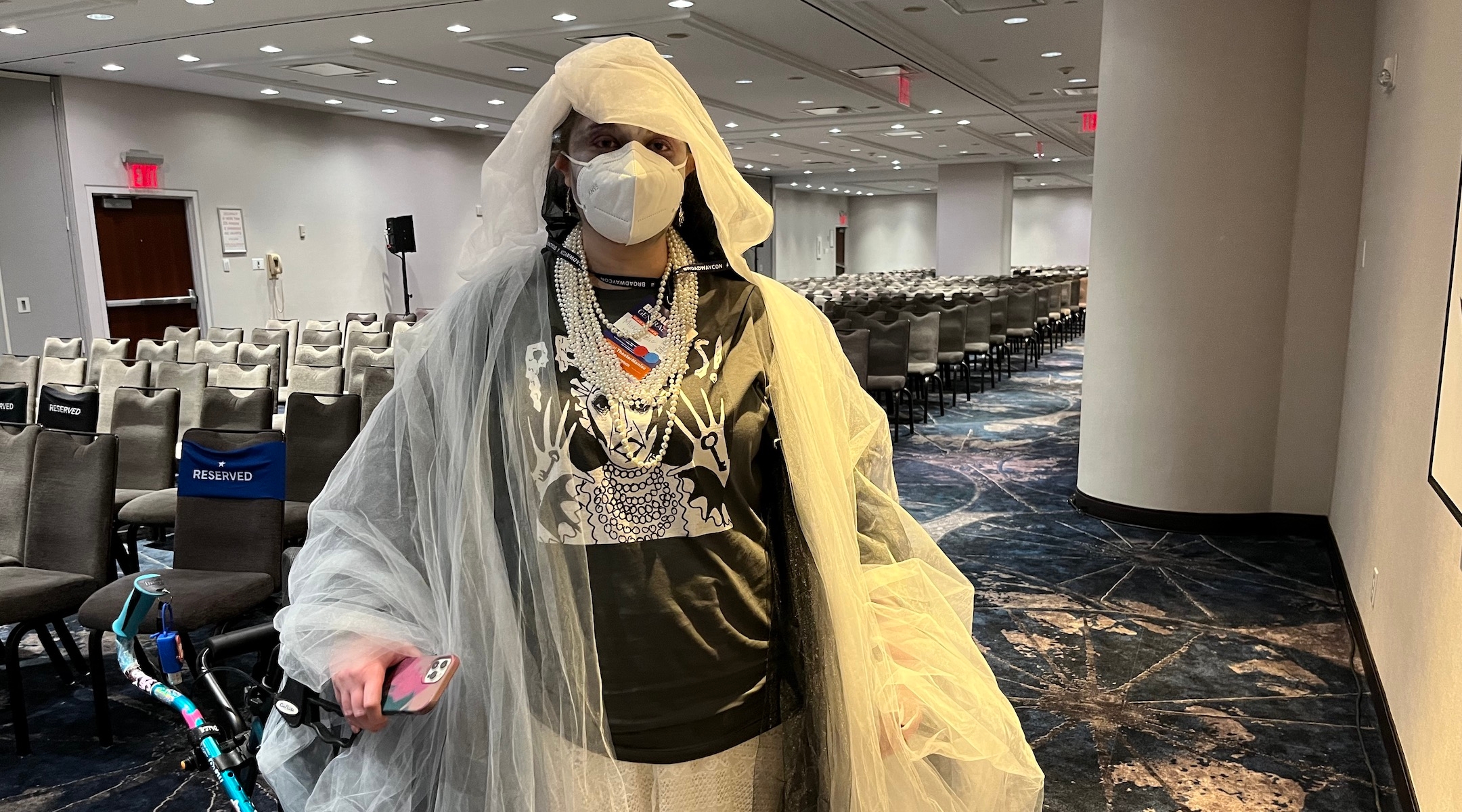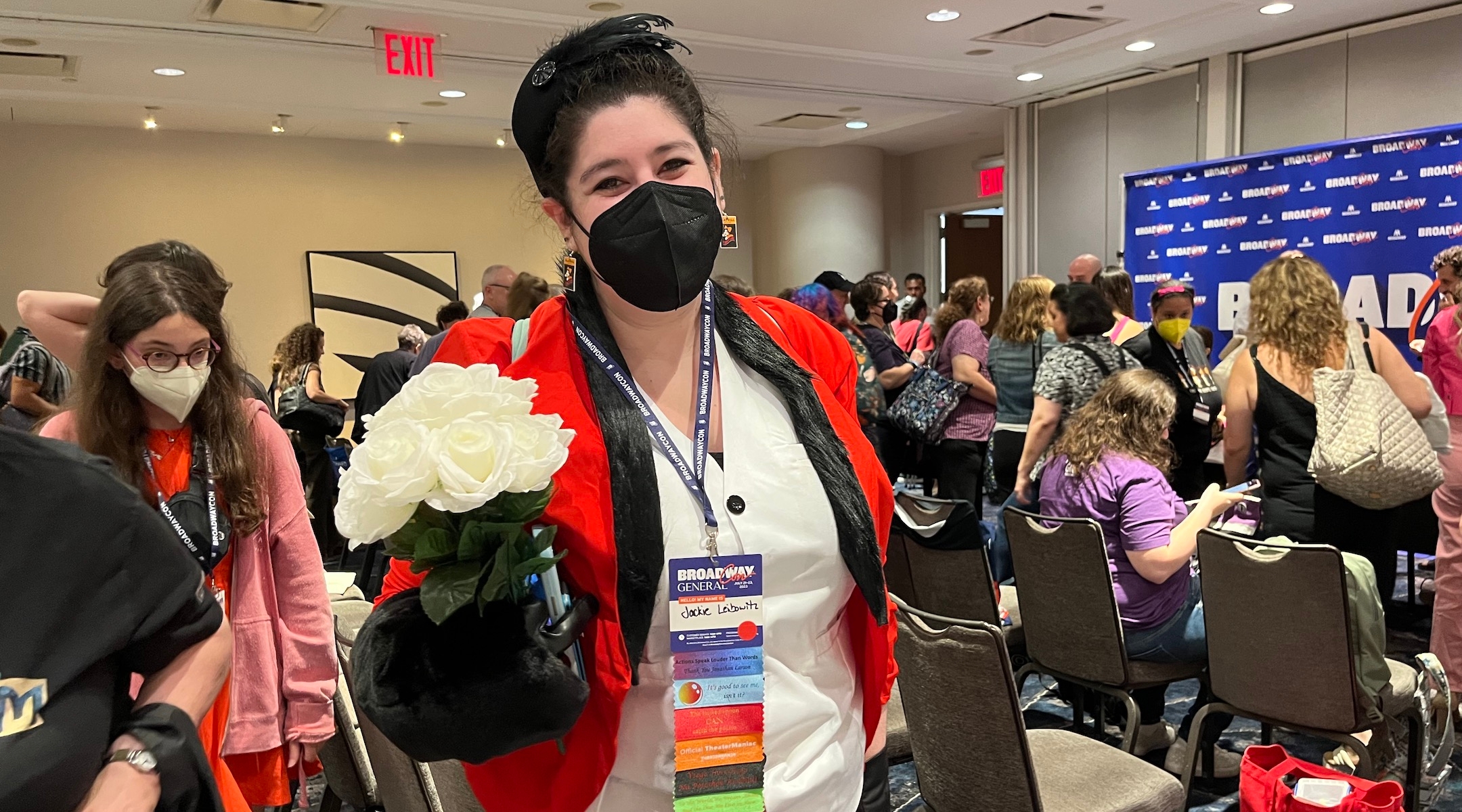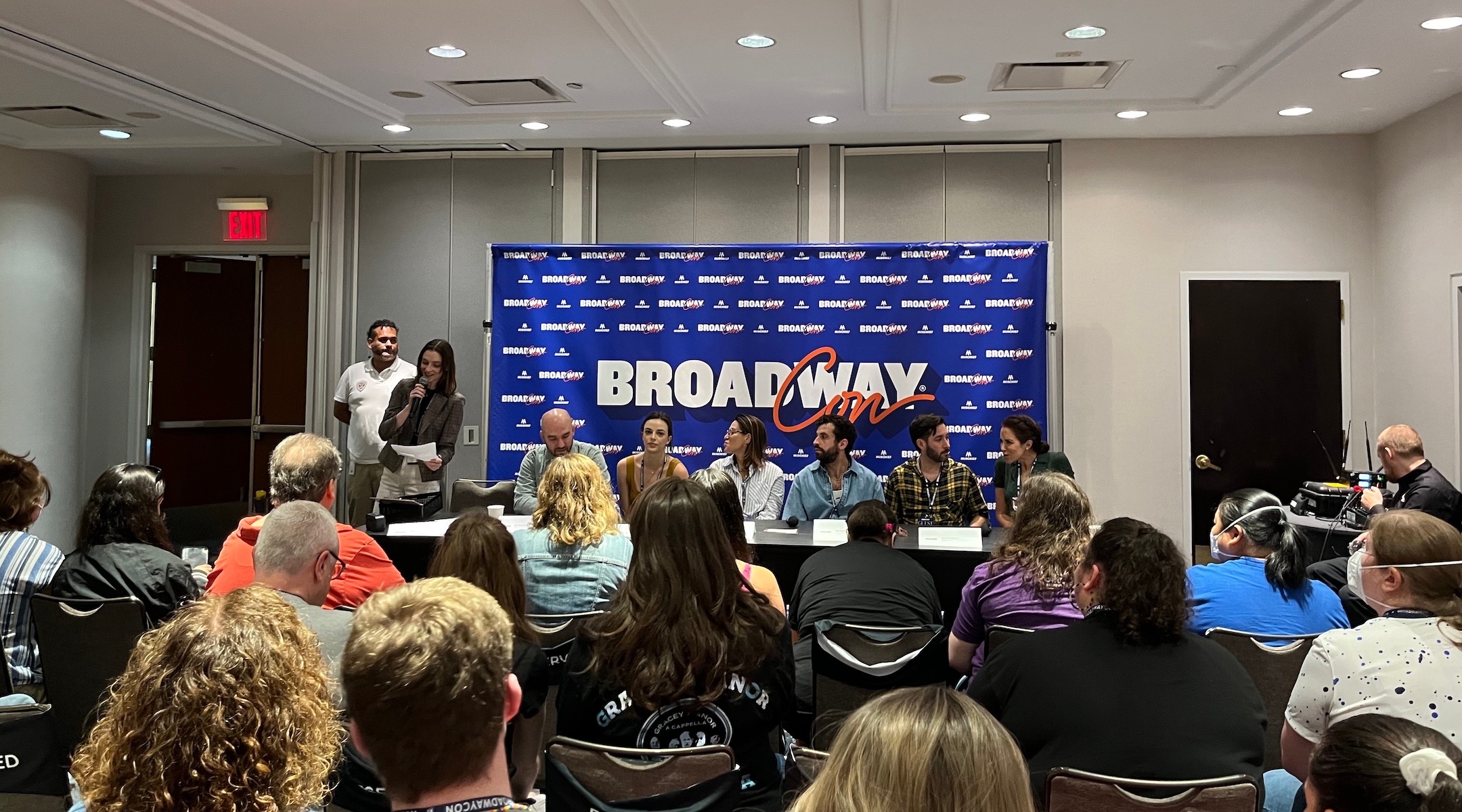(New York Jewish Week) – A woman dressed as Fanny Brice from “Funny Girl” and another dressed as Fruma Sarah from “Fiddler on the Roof” were among the 100-plus people who filed into a Midtown conference room on Friday morning to discuss Jewish identity on Broadway.
The Jewish fans — whose real names were Jackie and Michelle, and declined to share their last names — were dressed as their favorite Jewish musical characters, and were attending one of the first panel discussions of BroadwayCon 2023. The conference, at the New York Marriott Marquis hotel in Times Square, is an annual gathering in the vein of ComicCon that brings thousands of fans and industry professionals for a weekend of celebration, singing, discussion and meet-and-greets.
The panel, called “Jewish Identity and Broadway,” came together in less than a week, its organizer Ari Axelrod — a Jewish actor, singer and educator — told the New York Jewish Week. He said he organized it in response to the July 11 casting announcement for the national tour of “Funny Girl,” in which a non-Jewish actress had been chosen to play Fanny Brice, a role made famous by Barbra Streisand. Brice, a pioneering Jewish comedian in the early 20th century, struggled with her Jewish identity in her rise to fame.
In the aftermath of the casting announcement, the debate over whether or not non-Jews can play Jewish characters — a term actress and comedian Sarah Silverman dubbed “Jewface” — resurfaced online.
Amid the hubbub, “Somebody had said to me, ‘You should host something,’” Axelrod told the New York Jewish Week. “It was in direct response to the casting.”
While there have been Jewish-focused panels at BroadwayCon since the annual conference began in 2015, the past year has been a landmark one for Jewish stories on Broadway — particularly those that deal with antisemitism, including “Parade” and “Leopoldstadt,” which both won Tony Awards. “Parade,” about the real-life antisemitic lynching of Jewish factory superintendent Leo Frank in 1915, saw a neo-Nazi protest outside of the theater while it was in previews.  Michelle dressed at Fruma Sarah, the ghost that Tevye says haunts dreams in “Fiddler on the Roof.” (Julia Gergely)
Michelle dressed at Fruma Sarah, the ghost that Tevye says haunts dreams in “Fiddler on the Roof.” (Julia Gergely)
Michelle (dressed as Fruma Sarah) attends the conference every year, and said she was interested in the event because she is Jewish and became interested in Jewish representation on Broadway during a BroadwayCon panel she attended in 2020.
“There was a rabbi who was an actor. He said that there was a time he wasn’t cast to play a rabbi because he didn’t look Jewish enough,” she recalled. “I thought, ‘He’s a rabbi, how can you get more Jewish than that? It just really made me realize how much of an issue representation is for us.”
Speaking on the hour-long panel was Axelrod, who was named to the New York Jewish Week’s “36 Under 36” (now known as “36 to Watch”) in 2021; Talia Suskauer, who starred as Elphaba in the Broadway run and national tour of “Wicked”; Shoshanna Bean, who was nominated for a Tony Award last year for her performance in “Mr. Saturday Night”; Brandon Uranowitz, who last month won the Tony Award for Best Featured Actor in a Play for “Leopoldstadt”; Zachary Prince, who has been in several Broadway shows and recently performed in “A Transparent Musical,” based on the Jewish-themed TV show, in Los Angeles; and Alexandra Silber, who played Tzeitel in the most recent Broadway revival of “Fiddler on the Roof.” Moderating the panel was Becca Suskauer, a New York-based Jewish actress.
The wide-ranging discussion touched on Jewish representation, identity, pride and joy during a period of rising antisemitism. Panelists also noted that the goal of the conversation was to talk about how Broadway actors and insiders can actively uplift Jewish stories as well as those from other oppressed groups.
Suskauer emphasized that people should “listen before you speak and listen before you immediately go to pass judgment on something,” while Bean encouraged attendees to “be introspective” towards their own internalized prejudices if they are nervous to speak out on issues affecting marginalized groups.
Axelrod — echoing Michelle’s comment — spoke of the double standard that he feels exists within the industry — the idea that Jews are sometimes deemed “not Jewish looking enough” to play Jewish roles, but “too Jewish” to be cast in other roles. He also said there was a perceived double standard in that it’s considered acceptable for non-Jewish performers to be cast in Jewish roles, something that is frowned upon regarding other ethnic groups.
“There is this fear amongst the Jewish community that we can be Jewish, just not too Jewish,” Axelrod said. “We have a responsibility to dismantle that entire internalized assimilation within ourselves, because it’s important to show the world who we are. But to show them the world we can take multitudes, we first have to believe in ourselves.”
The “Funny Girl” casting only came up with 20 minutes left in the discussion. And while the actors made a point of noting that the actress chosen for the role, a Latina woman named Katerina McCrimmon, was very talented, they said it was nonetheless disappointing and worrisome to have a non-Jewish person playing Fanny Brice, who was a real person who often played on Jewish stereotypes to garner laughs from mainstream audiences.

An attendee of the panel dressed as Fanny Brice, the Jewish main character in “Funny Girl,” which will end its Broadway run this fall. (Julia Gergely)
“I was so excited for the role of Fanny Brice to be played by someone who is able to live so solidly and steadfastly and their Jewishness and who can bring that on the national tour to places that don’t have a lot of Jews,” Suskauer said. “I got immediately so scared when I heard that someone not Jewish was going to be playing at this Jewish stereotype. She can do this research, she can try to do it as respectfully as possible, but at the end of the day, she’s going to be playing at a stereotype while wearing bagels on her body.” (Suskauer was referring to “Private Schwartz from Rockaway,” a number in which Fanny imagines herself as a Jewish soldier and dances with bagels strung around her body.)
But the panel ended on a positive note. “‘To live is an actionable decision that we get to make every day, and when we say ‘l’chaim,’ we are literally saying ‘to life,’” Axelrod said. “I think it is imperative to every single person in this room that when you clink your Manischewitz, or your Kedem grape juice, and you say ‘l’chaim,’ mean it. Take those words as a call to action and do it, literally. Go do something that reminds you that you’re a Jewish person who was living your life.”
Rho and Maddy, teenage twins from New Jersey who declined to share their last names, said they attended the panel for the potential to meet Uranowitz, one of their favorite actors. They were surprised at how much the panel resonated with them. “It was really great to hear everyone’s opinions,” Rho said. “I’m so glad I came.”
“Especially as someone who is half-Jewish, there’s a lot of assimilation and sometimes being told and believing ‘you’re not really Jewish,’ or that doesn’t count,” Maddy said. “[This panel] definitely showed me I want to and can be an activist for my community.”
The New York Jewish Week brings you the stories behind the headlines, keeping you connected to Jewish life in New York. Help sustain the reporting you trust by donating today.





